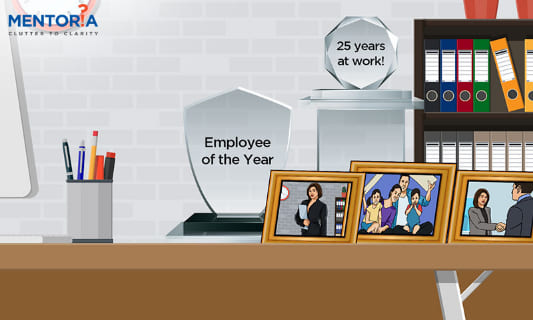Reasons Why Employees Say “I Love My Job”

Jump to Section
Over the course of time, you’ve probably come across the dreaded ‘exit interview’ quite often. It can be very disheartening, especially when good talent leaves for other opportunities. But you’re not alone – 56% of the workforce confesses to job-hopping in a short duration at least once. Even though the workforce today is in favour of job hopping, no organisation likes watching good employees leave. Especially after the time and effort you’ve invested in hiring and training an employee!
But how often are they candid about why they leave? Sometimes, even an exit interview fails to get to the root of the problem. So we decided to turn the question around and ask longtimers instead – why did you stay?
In July 1973, Harvard Business Review revealed that people stick around in their jobs because they are comfortable. Your workforce probably has a few employees who have been there for years, love what they do, and have built a life around their jobs. We asked a few such employees what made them stick around for so long, and here’s what we gathered.
Looking for a career that makes you say, “I love my work”? Take Mentoria’s holistic psychometric career assessment test to discover your ideal career based on your unique interests, skills and personality!
1. Give them an Opportunity to Explore their Passions

As the famous saying goes, when you do what you love, you won’t work a single day in your life! Take the case of Deepika Wad, an HR personnel working with a leading private airline for the past 18 years. What makes her so loyal to the same organisation after so long?
“Even after 18 years, my job still excites me like it did on day one. The secret lies in going for something you are passionate about. Take risks early and often. Strive to be happy, Most importantly, never be someone’s Option B.”
Deepika joined the organisation as a flight attendant, but her organisation never limited her to the same role. “Over the years I took on the duties of a Cabin Senior, Cabin Manager, Performance Manager, Grooming Trainer for Cabin Crew, Ground team and now I work with the HR department managing employee benefits division.” Her organisation understood her passions early on and gave her ample opportunities to grow and succeed in her career.
Have frequent conversations with your employees about their goals and aspirations. Maybe an employee wishes to switch departments, maybe they’d flourish better in another team. Get to know what excites them and what doesn’t, and ensure their minds are challenged enough; they’re less likely to look for opportunities elsewhere.
2. Leave the Timetable System for Schools!

The 21st-century workforce was never cut out for a punch-in punch-out system. They love their individuality and dislike adhering to a one-size-fits-all system. It’s not like your workforce is about to slack off – they’d just prefer working on their own time. Not every employee can be productive in the morning (I’m sure some of you aren’t morning people, either.), and not every employee can burn the midnight oil either. Introducing flexible hours helps your workforce work at its own pace.
Gautam Mehta, a senior analyst with a KPO, felt he was more productive when he worked at night, and his organisation was flexible enough to accommodate his preferences.
“My productivity peaks late in the night. And my company offers the flexibility of working at the hours of my choice, as long as I get the job done. This is a great advantage for my work-life balance, and that’s why I have stayed here for the past 12 years.”
His organisation acknowledged his need to work at his own pace, and made sure he had the freedom to work when he felt he could deliver his best. Having set timetables can be a dampener for those who like to work at their own time and pace, especially if you’re dealing with a millennial workforce. In fact, flexible work timing is the future of full-time jobs.
At Mentoria, we understand that personalisation is key, and nothing is one-size-fits-all. That’s why our expert career counsellors provide personalised step-by-step guidance to help you succeed at any stage in your career discovery journey.
3. Even the Senior-most Employees Need Opportunities to Grow

Individuals need an environment to thrive and grow. It’s great to have a wonderful job, and do what you love. But if your employees feel like they’ve peaked and there is no more room for growth, they are bound to get bored pretty quick.
“When you are allowed to learn and grow, you enjoy what you are doing. And when you enjoy, you stick around,” says Naimisha Sanghavi, associate Vice-President with a leading educational content agency. Naimisha began her career with the organisation, and continues to thrive there, even 20 years later, because there’s always room to learn new things and scale new heights.
Growth may not always mean promotions; sometimes, it means getting opportunities to learn something new. It is proven that if given a chance, 58% of employees would like to learn and grow at their own jobs. Employees want to give their best to the company, so it is important that they are given ample opportunities to do so.
4. Sometimes, the Right Leader makes all the Difference

While you may provide your employees with the best opportunities and policies, if they are constantly subjected to bad leadership, working becomes too stressful. In most cases, employees don’t leave the company; they leave their boss. When employees have someone to guide them and nurture their growth, they not only thrive, but look forward to working.
Take the case of Abhishek Kamath, Service Quality Manager with a leading courier service. He finds that one of the best parts of working is that he has bosses who not only care about the company’s growth, but also about how he can grow along with it.
“Leaders at my workplace take a genuine interest in shaping our careers. They take care of their employees. So, staying was not a difficult choice.”
If the bosses in your organisation are not approachable or good leaders, your employees are going to look for a better one.
5. Let them Deal with Challenges, not Difficulties
If your team members are turning in their assignments on time, don’t be too hard on them about taking longer breaks. Everyone works differently; some may prefer working at a stretch and then taking a break, or working in bursts. Permit your employees to clock in the necessary hours on a flexible schedule. This ensures that you don’t compromise on the output and they can plan their time with ease. Not only this but flexibility in the workplace also improves employee satisfaction and productivity which helps organisations in attracting and developing skilled talent.
6. Encourage their Well-being!

Give your employees opportunities to keep fit and healthy. This is a surprisingly easy and cost-effective perk to offer. When employees are healthy, they are less stressed out, they take less sick days, and are more energised/productive at work. It’s a win-win for everyone involved. You can also start by providing mental health awareness campaigns as well as counselling to individuals who are suffering. You can discuss offering mental health benefits to your employees with your firm’s healthcare provider or an insurance company. This will help employees to keep a track on their wellbeing.
7. Appreciate them

Do your employees feel like they’re being noticed at work? Consider this: more than 65 percent of employees say they are not recognised at work. If you really want to show that you care about your staff, consider expressing your appreciation to them on a regular basis.
Don’t wait for yearly anniversaries or milestones to show your appreciation for your employees’ efforts. Recognition programmes and awards are a terrific way to show your appreciation for your staff while also encouraging them to grow. Employee of the Month or ‘Brightest Idea of the Quarter’ are two programmes that might boost your team’s morale. You get the ability to express your heartfelt gratitude and admiration. For further support, include specific details about what the person did to win the honour. Employees are kept engaged through these programmes, which celebrate their accomplishments and create a pleasant and competitive work environment.
When your employees spend a certain amount of time with your organisation, they start seeing it as a second home, and their colleagues as family. Take care of your employees like family, and you will have built a happy workforce – one that doesn’t constantly feel the need to escape. And if you’re looking for ways to engage your employees, we have some great ideas that you could use.
Give your employees the gift of guidance: partner with Mentoria for our career counselling workshops, which provide expert guidance to your employees and their families to guide them through their career decisions. Our 4-step career guidance solution helps us find the right career fit for their families from 3 streams, 850+ courses & 12,000+ careers. Get in touch with us today!






